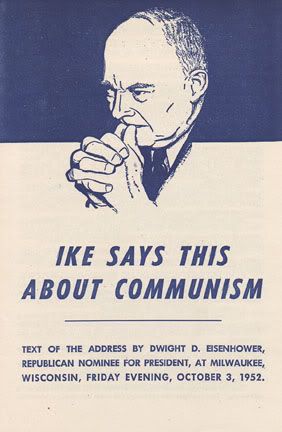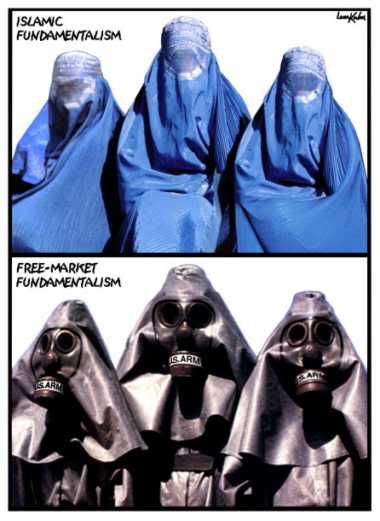Viral Democracy
At the Republican National Convention, George W Bush gave what was in all likelihood the best speech of his political career. A pundit afterwards referred to it as "Karl Rove's masterpiece". He was right. After years of protesting and satire, internet gifs with cowboy hats and monkey faces, books about his improper English, movies that play up his cartoonish john wayne swagger, Karl Rove and friends reinscribed every piece of criticism and every character trait projected onto the president over the years and used it to validate what is in fact a very endearing and sympathetic narrative. Is Bush the heavy-hearted, relentless and compassionate cowboy he made himself out to be in last night's speech? Probably not. Was he being honest in last night's speech? I believe so, and that was what really scared me.

For the first time, George Bush came out and explained, in what I believe were entirely straightforward, honest terms, the real reason he invaded Iraq. He didn't redirect to this reason, he didn't present his original arguments and create tangents to them, he presented one unified reason that he will apply retroactively to all other reasons. In his speech, he said:
"Others understand the historic importance of our work. The terrorists know. They know that a vibrant, successful democracy at the heart of the Middle East will discredit their radical ideology of hate......I believe in the transformational power of liberty: The wisest use of American strength is to advance freedom. As the citizens of Afghanistan and Iraq seize the moment, their example will send a message of hope throughout a vital region. Palestinians will hear the message that democracy and reform are within their reach, and so is peace with our good friend Israel."
I am very politically naive, I guess, I because I didn't imagine anyone would come out and say something like this in a nationally broadcast speech. This 'domino theory' is reflective of, if not hauntingly congruent with the reasons that previous American wars flopped. I am referring of course to the series of wars and skirmishes that America fought during during what can be considered part of a 'cold war', which relied on the untested assumption that political models operated virally. Knock down South Vietnam, install a communisti republic? Sout East Asia becomes a hotbed of socialism. Militarize and allow it to keep a functional, US backed democracy? Set an economic example and through trade and commerce indirectly force neighboring countries to eventually follow suit. (Footnote 1 I realize that epididemiological tropes are trendy in the post-Dawkins post-game theory era of social sciences and that I'm retroactively addressing history with the vogue of contemporary jargon. ) The American presence in Vietnam and Korea was rooted in the assumption that Communism, if left undetered, would swell over the world and create a less free, more poverty-stricken world, without the teary-eyed bliss of the free market and all of its many sweatshirts and well-proportioned hamburgers. However, when John Wayne tore down the Berlin wall with his bare hands, palms sweaty and muscles shifting like clockwork gears as Kraftwerk played in the background, we were given a somewhat brief reprieve from this version of America. And If the looming issues of Globalization replaced the dichotomy between Socialism and Capitalism, it was believed to be the lesser of two evils. Globalization as an academic discipline and as an ethical crisis is not the end product of Capitalism or the inevitable evolutionary product of Western thinking. Globalization as a crisis is capitalism's digestive problem after having subsumed (NOT eradicated) Socialism.
There is a reason Islam is sneered at. Islamic fundamentalism, as a global crisis boiling towards critical mass, is positively atavistic in comparison with the last Ambiguous Ideological threat, communism. In so far as early forms of socialism were created specifically as an alternative to Capitalism by people working within a Capitalist framework, I see communism as an innoculation that capitalism created to strengthen itself. Anti-capitalist ideologies are just capitalism's form of self-therapy. Religious fundamentalism, however, doesn't seem to be a positive or logical response to anything. It's an alternative to centuries old traditions, many of its tenets absurdly out of context. You could call renewed fundamentalism a reaction to globalization and Westernization, but really, is there such a distinct correlation? At least we know, pretty precisely, where Communism came from and why it became popular. But what the fuck does Allah have to do with the presence or persistence of a global free market?

Mcluhan believed that periods of nostalgia came about during times of great social or technologically upheaval. Following this logic, maybe religious fundamentalism resurges during crisis points where there is no swelling end to history, where there is nothing visible on the horizon to expose nostalgia. Think about what it means that the historical epoch that the capitalist free-market was supposedly meant to evolve into is now itself a memory, relegated to third world nations and undergraduate dorms. Fundamentalism isn't an alternative to anything, but rather the product of existential dread. Fear of death on a global scale; the absence of an alternative to the free market has left a gaping event horizon at the end of capitalism, which results in exagerrated claims about Globalization's evils and frightened adherence to old roots and customs. Even Al Gore says so:
"It's the
American version of the same fundamentalist impulse
that we see in Saudi Arabia, in Kashmir, in religions
around the world: Hindu, Jewish, Christian, Muslim.
They all have certain features in common. In a world
of disconcerting change, when large and complex forces
threaten familiar and comfortable guideposts, the
natural impulse is to grab hold of the tree trunk that
seems to have the deepest roots and hold on for dear
life and never question the possibility that it's not
going to be the source of your salvation. And the
deepest roots are in philosophical and religious
traditions that go way back."

Art depicting a perceived opposition between free-markets and religious fundamentalism, when there isn't really a coherent relation.
Viral Democracy was a flawed idea when it was combatting Communism, but at least it was meant to oppose an ideology of the market. The idea that religious dictatorships can be transformed into democracies is not only unprecedented, it misses the point entirely by several thousand miles and several tons of bombs. Hussein's regime was chosen, possibly because it was the easiest to remove. The motives were not far from altruistic either: the Middle East is a warzone, and the current regime genuinely believes decades old border skirmishes will dissolve thanks to the power of a free(er) market. Unfortunately, the viral model has been long obsolete in the post-cold war world. All it does is reinforce the picture the anti-WTO folks have painted, in which global trade is not the cure but the new disease

